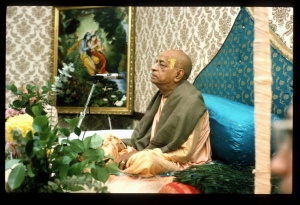SB 6.2.28: Difference between revisions
No edit summary |
(Vanibot #0054 edit - transform synonyms into clickable links, which search similar occurrences) |
||
| Line 23: | Line 23: | ||
<div class="synonyms"> | <div class="synonyms"> | ||
''vṛddhau'' | ''[//vanipedia.org/wiki/Special:VaniSearch?s=vṛddhau&tab=syno_o&ds=1 vṛddhau]'' — old; ''[//vanipedia.org/wiki/Special:VaniSearch?s=anāthau&tab=syno_o&ds=1 anāthau]'' — who had no other person to look after their comforts; ''[//vanipedia.org/wiki/Special:VaniSearch?s=pitarau&tab=syno_o&ds=1 pitarau]'' — my father and mother; ''[//vanipedia.org/wiki/Special:VaniSearch?s=na&tab=syno_o&ds=1 na] [//vanipedia.org/wiki/Special:VaniSearch?s=anya&tab=syno_o&ds=1 anya]-[//vanipedia.org/wiki/Special:VaniSearch?s=bandhū&tab=syno_o&ds=1 bandhū]'' — who had no other friend; ''[//vanipedia.org/wiki/Special:VaniSearch?s=tapasvinau&tab=syno_o&ds=1 tapasvinau]'' — who underwent great difficulties; ''[//vanipedia.org/wiki/Special:VaniSearch?s=aho&tab=syno_o&ds=1 aho]'' — alas; ''[//vanipedia.org/wiki/Special:VaniSearch?s=mayā&tab=syno_o&ds=1 mayā]'' — by me; ''[//vanipedia.org/wiki/Special:VaniSearch?s=adhunā&tab=syno_o&ds=1 adhunā]'' — at that moment; ''[//vanipedia.org/wiki/Special:VaniSearch?s=tyaktau&tab=syno_o&ds=1 tyaktau]'' — were given up; ''[//vanipedia.org/wiki/Special:VaniSearch?s=akṛta&tab=syno_o&ds=1 akṛta]-[//vanipedia.org/wiki/Special:VaniSearch?s=jñena&tab=syno_o&ds=1 jñena]'' — ungrateful; ''[//vanipedia.org/wiki/Special:VaniSearch?s=nīca&tab=syno_o&ds=1 nīca]-[//vanipedia.org/wiki/Special:VaniSearch?s=vat&tab=syno_o&ds=1 vat]'' — like the most abominable low-class person. | ||
</div> | </div> | ||
Latest revision as of 22:38, 18 February 2024

A.C. Bhaktivedanta Swami Prabhupada
TEXT 28
- vṛddhāv anāthau pitarau
- nānya-bandhū tapasvinau
- aho mayādhunā tyaktāv
- akṛtajñena nīcavat
SYNONYMS
vṛddhau — old; anāthau — who had no other person to look after their comforts; pitarau — my father and mother; na anya-bandhū — who had no other friend; tapasvinau — who underwent great difficulties; aho — alas; mayā — by me; adhunā — at that moment; tyaktau — were given up; akṛta-jñena — ungrateful; nīca-vat — like the most abominable low-class person.
TRANSLATION
My father and mother were old and had no other son or friend to look after them. Because I did not take care of them, they lived with great difficulty. Alas, like an abominable lower-class man, I ungratefully left them in that condition.
PURPORT
According to Vedic civilization, everyone has the responsibility for taking care of brāhmaṇas, old men, women, children and cows. This is the duty of everyone, especially an upper-class person. Because of his association with a prostitute, Ajāmila abandoned all his duties. Regretting this, Ajāmila now considered himself quite fallen.